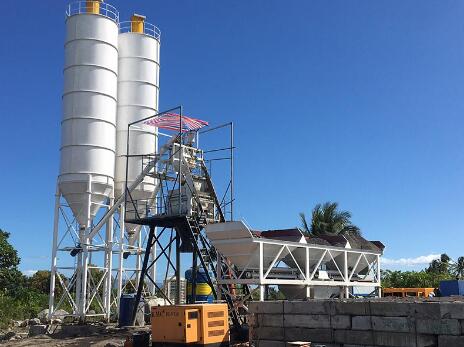What are the types of concrete batching plant?
In the realm of construction and infrastructure development, concrete plays a pivotal role. It's the very foundation upon which we build our cities, homes, and roads. The quality of concrete used in a project can significantly impact its durability and strength. To ensure the highest standards are met, the choice of the right concrete batching plant is crucial. In this article, we'll delve into the various types of concrete batching plants available today, shedding light on their unique characteristics, advantages, and applications.

1. Stationary Concrete Batching Plant
The stationary concrete batching plant is a fixture at large construction sites, producing a consistent supply of high-quality concrete. This type of plant is known for its reliability and robustness. Key features include:
High Production Capacity: Stationary plants can produce large volumes of concrete in a relatively short time.
Precise Mixing: These plants offer precise control over the mix, ensuring uniformity and consistency.
Long Lifespan: Due to their stationary nature, they are less subject to wear and tear.
Applications: Stationary concrete batching plants are ideal for mega construction projects such as bridges, dams, and high-rise buildings.
2. Mobile Concrete Batching Plant
For projects requiring flexibility and mobility, the mobile concrete batching plant is the go-to choice. It offers numerous advantages:
Portability: These plants can be easily transported to different job sites, saving time and resources.
Quick Installation: Setting up a mobile plant is swift, allowing for immediate production.
Adaptability: Mobile plants can be customized to suit various concrete mix designs.
Applications: Mobile concrete batching plants are perfect for smaller projects, remote locations, and infrastructure repair work.
3. Compact Concrete Batching Plant
Compact concrete batching plants strike a balance between stationary and mobile plants. They are known for their space-saving design and efficiency:
Small Footprint: These plants require minimal space, making them suitable for congested construction sites.
High Performance: Despite their compact size, they deliver excellent production rates.
Easy Maintenance: Maintenance is simplified due to the plant's manageable size.
Applications: Compact concrete batching plants are versatile and can be used in a wide range of construction projects, including urban development and housing complexes.
4. Dry Mix Concrete Batching Plant
In situations where the transportation of wet concrete is impractical, dry mix concrete batching plants come into play:
Waterless Mixing: Dry mix plants pre-mix the dry ingredients, requiring only water to be added on-site.
Reduced Wastage: Precise measurements minimize material wastage.
Cost-Efficiency: They are often more economical for small-scale projects.
Applications: Dry mix concrete batching plants are favored for remote locations, as well as for projects with limited water supply.
5. Central Mix Concrete Batching Plant
Central mix plants are the epitome of precision and quality control:
Centralized Mixing: These plants have a central mixer, ensuring thorough and consistent blending.
High-Quality Output: The concrete produced is of the highest quality, meeting stringent standards.
Automation: They often feature advanced automation systems for precise control.
Applications: Central mix concrete batching plants are used in projects where top-notch quality and precision are non-negotiable, such as major infrastructure development.
6. Continuous Concrete Batching Plant
For uninterrupted production, continuous concrete batching plants are the way to go:
Non-Stop Production: These plants can operate 24/7, ensuring a constant supply of concrete.
Low Operating Costs: Continuous production reduces startup and shutdown costs.
High Volume Output: They are designed for high-output applications.
Applications: Continuous concrete batching plants are suitable for large-scale projects that require a constant and uninterrupted supply of concrete.
In conclusion, the choice of a concrete batching plant depends on various factors, including the scale of the project, location, and specific requirements. Each type of plant has its unique strengths and applications, ensuring that there's a suitable option for every construction endeavor.
567
0
0


Comments
All Comments (0)